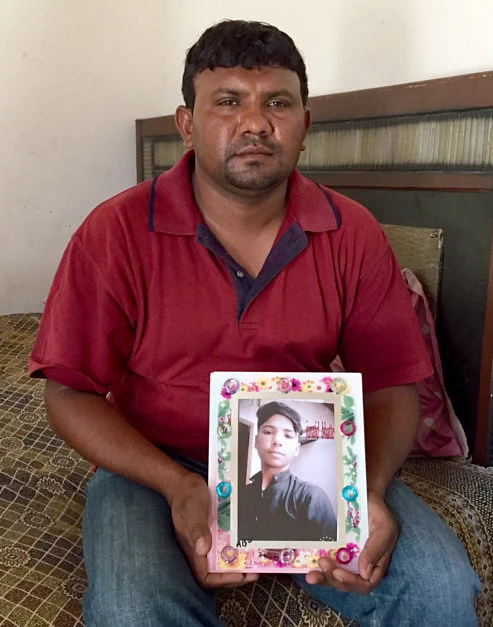Lahore When a suicide bomb exploded on Easter Sunday at a crowded park near his home, killing dozens, Khalid Saeed was saddened but not surprised. Saeed had already seen the reach of Islamist militants first-hand.
This year, a disgruntled former business partner had shown up at the 45-year-old builder’s office and handed him a summons from the “Arbitration Court of Sharia,” a reference to Islamic religious law.
It was printed on the letterhead of Jamaat-ud-Dawa, the political arm of a terrorist organisation whose founder has a $10 million (Dh36.73 million) US bounty on his head.
After he failed to appear for the hearing at a mosque in Lahore, Saeed said, he began receiving threatening phone calls.
Undeterred, he sued the Pakistani government. A judge recently ordered the Interior Ministry to investigate whether Jamaat-ud-Dawa was running a parallel justice system in the country’s second-largest city.
Blind eye
The group acknowledges operating a religious council to mediate disputes, but denies that it coerces anyone into obeying its rulings.
The legal tussle underscores the influence that extremist groups exert in Pakistan, often right under the government’s nose.
Even as the army vows to crack down on Islamist militants it blames for devastating attacks at home, it turns a blind eye to some groups, such as Jamaat-ud-Dawa, that support the military’s strategic aims outside Pakistan.
Since 2014, the army has waged an offensive targeting the Pakistani Taliban, a breakaway faction of which claimed responsibility for the Easter bombing.
But analysts say there has been no clampdown on what Pakistan’s security establishment regards as “good” militant organisations — those that don’t attack Pakistan and whose ranks include fighters willing to carry out operations in India or Afghanistan.
Those organisations include Jaish-e-Mohammad, which India blames for a deadly raid on an airbase near the border in January, and which is building a massive new seminary in southern Punjab.
Then there’s Jamaat-Ud-Dawa, which the US and United Nations have described as a front for Lashkar-e-Taiba, the terrorist group accused of planning the November 2008 attacks in Mumbai, India.
Jamaat-ud-Dawa is so powerful in Punjab, said Saeed’s lawyer, Maqbool Hussain Shaikh, that “judges usually won’t even hear cases” against the group.
But Pakistan’s balancing act with “good” and “bad” militants has become riskier, analysts say.
Under pressure by the military campaign, many Pakistani Taliban fighters are believed to have sought shelter with or switched to the “good” groups, which share similar jihadist ideologies even if they oppose shedding blood in Pakistan.
“The militancy still has the wherewithal in Punjab ... they have sufficient clout and power, and they continue to operate,” said Ayesha Siddiqa, an independent expert on security affairs.
Good, bad, ugly
Increasingly, she said, “it is difficult to separate ‘good’ militants from ‘bad’ militants.”
Jamaat-ud-Dawa casts itself as a charitable and social organisation, known in part for its extensive network of schools and medical facilities.
But it also operates out of a heavily guarded headquarters north of Lahore and has gained followers for its stance on ousting rival India from the disputed territory of Kashmir.
Its founder, Hafiz Mohammad Saeed, who is not related to the builder, moves freely in Lahore and occasionally lectures at universities despite a US State Department reward for his capture.
In surveys, most Pakistanis say the country’s laws should follow the teachings of the Quran, and in 1980 the country established a Federal Sharia Court that has the authority to determine whether laws conform to Islam.
But amid widespread dissatisfaction with Pakistan’s justice system, informal Islamic arbitration mechanisms known as jirgas have sprung up in areas where militant groups have influence.
“If I am an ordinary citizen and the courts are not delivering, the legal process is very cumbersome, the police are not going to help, here’s an alternative,” Siddiqa said.
That tension, between secular and religious legal systems, has been highlighted in the case of Khalid Saeed. His former business partner, Mohammad Azam, says Saeed owes him $100,000.
Saeed said he and Azam sought to resolve the real estate dispute in Pakistan’s formal courts beginning in 2011. The case was still pending when Azam handed Saeed the summons in January.
Saeed wrote to the Punjab government, the federal Home Affairs Ministry and military officials to take action against Jamaat-ud-Dawa, but no one did. Finally, he filed his own suit.
What makes Saeed’s case unusual is that he received a written notice, complete with a logo featuring the scales of justice, and that he dared to challenge Jamaat-ud-Dawa publicly.
“These goons are controlling Lahore,” Saeed said in an interview at a small rented apartment where he has moved his family to escape threats. “The government has no authority.”
In court, a lawyer for Jamaat-ud-Dawa said that the summons was a forgery and denied that Saeed had been coerced.
— Los Angeles Times
Sign up for the Daily Briefing
Get the latest news and updates straight to your inbox
Network Links
GN StoreDownload our app
© Al Nisr Publishing LLC 2026. All rights reserved.
